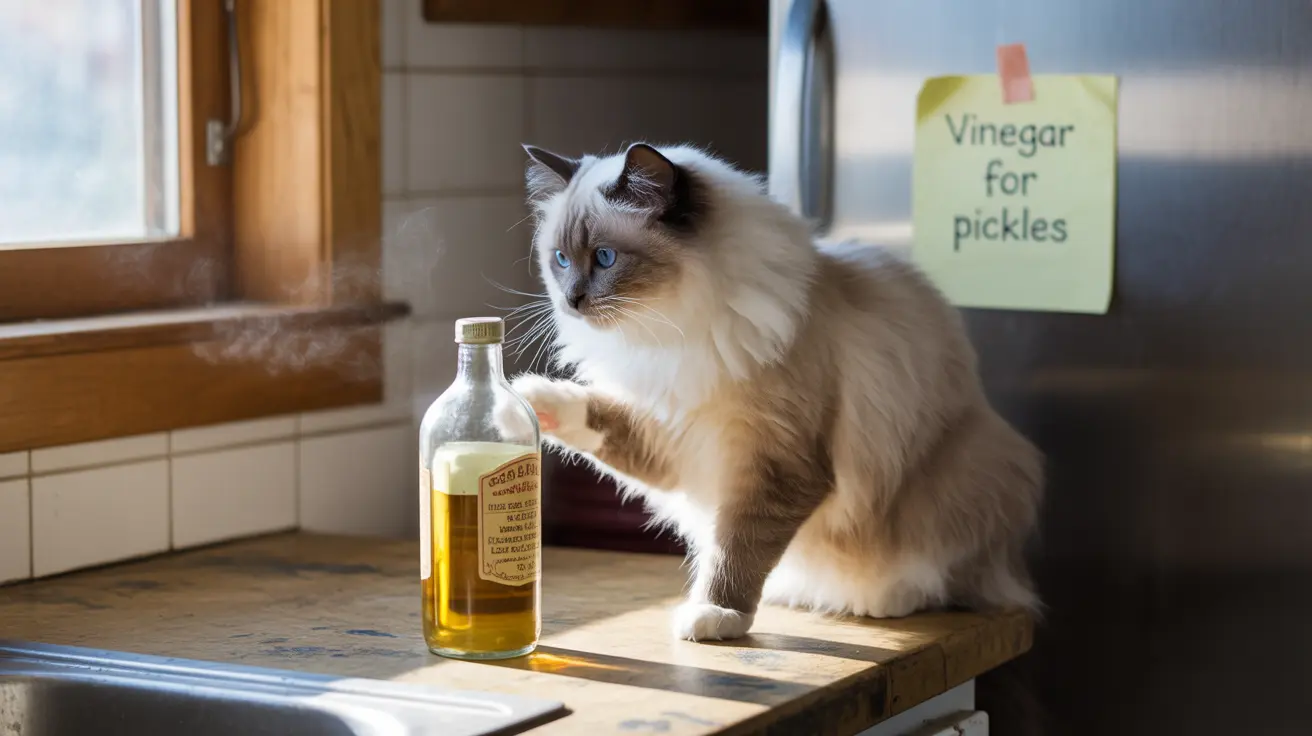Understanding Vinegar and Your Cat's Safety
Many cat owners use vinegar as a natural cleaning solution or home remedy, but questions about its safety for felines are common and valid. While vinegar isn't inherently toxic to cats, its strong acidic properties can pose certain risks that every pet parent should understand.
In this comprehensive guide, we'll explore the safety concerns, potential risks, and appropriate uses of vinegar around cats, helping you make informed decisions about its use in your pet-friendly household.
The Truth About Vinegar and Cat Safety
Vinegar, whether white or apple cider, contains acetic acid that gives it its characteristic sharp smell and taste. While not poisonous to cats, undiluted vinegar can cause significant irritation to your cat's sensitive tissues and digestive system.
Most cats naturally avoid vinegar due to its strong scent, which actually serves as a protective mechanism. However, accidental exposure or well-meaning but misguided use of vinegar-based remedies can lead to health issues.
Potential Risks and Health Concerns
Direct Consumption Risks
If your cat ingests undiluted vinegar, they may experience:
- Mouth and throat irritation
- Stomach upset and vomiting
- Diarrhea
- Gastrointestinal discomfort
- Potential ulceration of mouth tissues
Environmental Exposure Concerns
Even when used for cleaning, vinegar can affect cats through:
- Respiratory irritation from fumes
- Skin sensitivity from direct contact
- Eye irritation
- Aggravation of existing health conditions
Safe Uses of Vinegar Around Cats
Household Cleaning
When using vinegar for cleaning:
- Always dilute with water (1:1 ratio recommended)
- Ensure proper ventilation
- Allow surfaces to dry completely
- Keep cats away during cleaning
- Store cleaning solutions securely
Special Considerations for At-Risk Cats
Cats with certain health conditions require extra precautions:
- Avoid all vinegar exposure for cats with kidney disease
- Exercise extreme caution with respiratory-sensitive cats
- Consider alternative cleaning solutions for households with elderly or immunocompromised cats
Common Myths and Misconceptions
Despite popular beliefs, vinegar is not effective for:
- Treating flea infestations
- Curing urinary tract infections
- Resolving skin conditions
- Boosting immune system function
Always rely on veterinarian-approved treatments for these health concerns rather than home remedies.
Frequently Asked Questions
Is vinegar toxic or harmful to cats if they accidentally ingest it?
While not toxic, undiluted vinegar can cause significant irritation to your cat's mouth, throat, and digestive system. If ingested in large quantities, seek veterinary attention.
Can I safely use diluted vinegar for cleaning around my cats at home?
Yes, diluted vinegar (1:1 with water) is generally safe for cleaning when used properly. Ensure good ventilation and let surfaces dry completely before allowing cat access.
Does vinegar effectively repel fleas or help with flea control on cats?
No, vinegar is not an effective flea treatment. While some fleas may be repelled by the smell, it doesn't kill them. Use veterinarian-approved flea treatments instead.
Are there any health risks to cats with kidney disease from exposure to vinegar?
Yes, cats with kidney disease should avoid all vinegar exposure as it can further disrupt their body's acid-base balance and potentially worsen their condition.
How can I use vinegar as a cat deterrent without causing irritation or distress?
If using vinegar as a deterrent, heavily dilute it and apply it to areas you want cats to avoid. Never spray directly on or near cats, and ensure they have plenty of vinegar-free spaces.
Conclusion
While vinegar isn't inherently dangerous to cats, its use requires careful consideration and proper precautions. For cleaning purposes, diluted vinegar can be safe when used responsibly, but avoid using it as a medical treatment or remedy for your cat. Always consult with your veterinarian about safe and effective solutions for your cat's health concerns.






